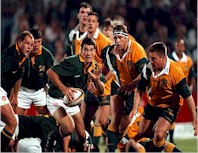What to do when Sales guys are Waterholics ...
Here is today's best question in my long list of emails. The Sales guys don't want Scrum in a company because they think they can't commit to the customer to close deals.
"We need to sign the contract first. The customer does not sign the contract, if finish date, price and features list are not in the contract. When using waterfall, the customer has all of that. That's how sales works. That's what we offer to them. With SCRUM either end date or features list is not defined. And end price is also not defined! We can't sell anything that way!"
Here is my answer ...
Your sales guy's are clueless about Scrum. They should take the Certified ScrumMaster class so they know what they are talking about. First they might start applying Scrum to their work in Sales. Then they could understand what the developers should be doing.
Our venture capital group runs company acquisitions using Scrum. The most junior guy on our team is the former SVP of Global Sales for Oracle. He could probably give a good answer for your sales force and maybe help them start using Scrum.
Basically, a sales plan calls for closing deals. This is the product backlog. The velocity of closing should be known by the sales guys. They have a list of tasks that need to happen to close the deal as the opportunity moves through the sales funnel. This can all be mapped out on the Scrum board. They should have a burndown chart that shows deal closing for a Sprint. They can burn down revenue achieved.
The immediate deals are locked and loaded for closing. The ones further out are in the planning stage for closing. Further out the deals are forecast just like software features. You know you will achieve a closing velocity but don't know exactly which deals will close.
So for Scrum, whether for sales or software development you need a plan (product backlog). The product backlog needs to be prioritized. The closing velocity needs to be estimated by the individual teams, the revenue needs to be committed to in the plan based on closing velocity, and the projects need to be DONE (whether they are closing sales plans or finishing software development contracts). There is always a roadmap owned by the product owner from which commitments are made.
This is exactly the opposite of what your sales guy is saying. We have a lot of teams that say they are doing Scrum but do not have product backlog, estimates, velocity, and burndown. Your sales guy must have seen some of these dysfunctional teams and completely misinterpreted Scrum.
Trifork in Denmark runs their sales with Scrum. All their sales people are Certified ScrumMasters. Every time they stop updating the Scrum Board they start losing track of deals and revenue and need to refocus on getting the Scrum Board updated. The VP of Sales runs the board as most of the people are on the road all the time.
When they close a software development contract, a sales person is sometimes the ScrumMaster leading the software development team. In this way the sales guys make money for the company while selling instead of wasting a lot of money on their expenses and driving up cost of sales. Once inside the company as a ScrumMaster they can sell even more stuff.
As for development, some of the leading companies in the world are doing fixed price contracts in Scrum. They know all the features, they estimate them all, and they commit a date to deliver. They then work an Agile process to finish the contract early and save money for the customer while driving up margins for themselves. It may be your Scrum teams are in the very early stage of maturity and are not able to make the committments that the sales people need. Or they have not educated the sales people properly. This is the responsibility of your Chief Product Owner. Do you have one?
 Scrum is an Agile development framework that Jeff Sutherland invented at Easel Corporation in 1993. Jeff worked with Ken Schwaber to formalize Scrum at
Scrum is an Agile development framework that Jeff Sutherland invented at Easel Corporation in 1993. Jeff worked with Ken Schwaber to formalize Scrum at 

1 Comments:
I think contract negotiation is all about trust/establishing a trust. You either have it or you don't. If you don't there is no true collaboration and thus it is not likely that you will succeed.
Mary Poppendieck has published a presentation about agile contracts some years back but I still feel it being valuable.
Post a Comment
<< Home